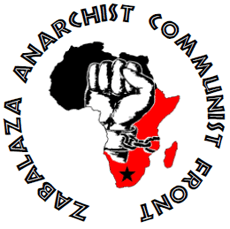To vote or not to vote: Should it be a question?
by Shawn Hattingh & Jonathan Payn
There has been much hype, amongst the media and sections of the public, in the run up to this year’s provincial and national elections in South Africa and, for some, the arrival of new parties to the electoral arena has renewed their faith in the possibility of an electoral solution to the myriad of problems facing South Africa. Politicians from across all parties have been using this hype and a seemingly renewed faith in the ballot box to their advantage.
The question, therefore, is: can equality, socialism, national liberation or ‘economic freedom’ – or even a respite from state violence – for a majority be brought about through parties and activists entering into the state or through voting for parties that promise not to use the state for violent or oppressive means; or will this only lead to a dead-end for the working class yet again?
Mayday: Building A New Workers Movement
 International anarchist statement
International anarchist statement
For far too long major segments of the working class have been dormant under the illusion that change can be delegated to exterior organizations or parties. When our struggles are bureaucratized and delegated to others, we lose ownership over them and in turn lose many benefits gained through them. A victory for the working class can only be established if our class is active in the struggle leading to victory.
From the battle for the 8 hour day, to the struggles witnessed this past year, these examples cry out for the need to organize the fight back against the war that is being waged on workers at home and abroad. Through these examples we can begin to see an alternate future and experiment towards it. This new workers’ movement must be established on class struggle lines, a movement that no longer waits for politicians and bureaucrats to resolve the growing inequalities and oppressions. A movement of workers organized through our own self-activity for democratic, combative and autonomous labor and community organizations must replace the stale forms of unionism and social democratic lobbyism that have dominated and compromised most struggles of the last decades.
[Italiano] [Castellano]
See also:
- Beyond MayDay Celebrations: Towards a Viable Counter Movement in Nigeria
- May Day 2014
- Pou Yon Premye Me Rezistans !
- El Primero de Mayo de 1914 en Colombia
- Why May Day matters to Malawi…History with anarchist roots
- H Eργατική Πρωτομαγιά στη δεκαετία του 1930
- To Taksim To Win
- CGT reclama repartir el trabajo y la riqueza en el 1º de mayo
- Ως τώρα είμαστε το τίποτα
Don’t Vote! Organise!
by Soundz of the South (SOS)

![]() In the build up to the 2014 elections, politicians – whether from the DA, ANC, EFF, or PAC – have been calling on us to vote. As part of this, they have promised to meet people’s needs, end poverty and serve communities when they are elected. The promises of all these politicians are lies.
In the build up to the 2014 elections, politicians – whether from the DA, ANC, EFF, or PAC – have been calling on us to vote. As part of this, they have promised to meet people’s needs, end poverty and serve communities when they are elected. The promises of all these politicians are lies.
Politicians don’t give a damn about workers and the poor; all they care about is their own power. They will tell us anything to get nice jobs in parliament. When politicians get into the state – whether at a municipal or national level – all they do is pass laws and put in place policies that benefit themselves and their rich friends. They protect their own interests and those of their allies in the form of the capitalists when they are in the state. Far from serving us; they wage a war on us. Read the rest of this entry »
Revolutionary Trade Unionism: The Road to Workers’ Freedom

The trade unions are the combat organisations of the working class. They were built to defend and advance workers’ interests against the bosses.
BUT the unions can be MUCH more. The unions have the potential not only to fight the bosses in the here and now. They can ALSO organise the workers for a REVOLUTIONARY GENERAL STRIKE. This means that the workers take the land, mines and factories from the bosses and politicians. It means we run them in the interests of the workers and the poor.
Real democratic socialism and real working class freedom and power will never come through getting new political parties into parliament. This is an illusion. Parliament is the graveyard of struggles. It is the place where the radicals of yesterday become the crooked politicians of today.
Socialism, freedom and power can only come through class struggle. This means organising in communities AND building strong worker organisations.
The Crisis, Bailouts, Quantitative Easing, Tapering and Class War
 by Shawn Hattingh
by Shawn Hattingh
Since 2009 the US state has been undertaking Quantitative Easing (QE), which has involved the US state creating $ 85 billion a month, effectively electronically printing money out of thin air, and linking this to the “purchasing” of paper assets like US government bonds and also more importantly mortgaged backed securities from banks, hedge funds, private equity firms, and asset management companies, which lost their value when the capitalist crisis hit hard in 2008. Through this, these financial institutions and banks have been given up to $ 85 billion a month for the last five years. Much of this money has been used by these corporations to increase their speculative activity, including speculating on government bonds sold by the likes of the South African, Brazilian, Argentinean, and Turkish states. Now the US state has been looking to start tapering QE and speculators as a result are exiting these government bond markets. As this article explores it will probably not be the ruling class (capitalists and top state officials) that suffer the worst convulsions associated with tapering, although they may be affected, but the working class in countries such as South Africa, Brazil, Indonesia, India, Argentina and Turkey. This article examines why and how this could take place, how ruling classes from different countries are trying to protect themselves; and why and how the working class will in all likelihood be worst hit. In order to, however, understand how the class war around QE is unfolding it is important first to look at the role states have played during the crisis, along with the competition that exists between states.
What does the ZACF stand for?

![]() Zabalaza means struggle, the continual struggle of the working class to access real freedom. We mean freedom from the repression of the state, and oppression by multi-national as well as local companies. Too long has a small elite been in control. Workers and their communities have risen up many times in the past but have always been crushed by the police forces of the state. In the past the working class – including the poor and unemployed – has protested but often lost: social movements have burnt out and trade union leaders have made bad deals with the bosses.
Zabalaza means struggle, the continual struggle of the working class to access real freedom. We mean freedom from the repression of the state, and oppression by multi-national as well as local companies. Too long has a small elite been in control. Workers and their communities have risen up many times in the past but have always been crushed by the police forces of the state. In the past the working class – including the poor and unemployed – has protested but often lost: social movements have burnt out and trade union leaders have made bad deals with the bosses.
The Story of the Korean Anarchists and the Anarchist Revolution in Manchuria, 1929-1931
 The Korean anarchist movement wanted to build an independent self-governing anarchist society, a cooperative system of the masses of the Korean people. They wanted to take civilisation from the capitalist class, and return it to the popular classes. By doing so, the capitalist and colonial society that existed in Korea (as elsewhere in Africa and Asia and east Europe) would be replaced with a new society. This new society would be based on the principles of freedom and equality, that guarantee the independent self-rule of the producing classes: the working class and the peasantry.
The Korean anarchist movement wanted to build an independent self-governing anarchist society, a cooperative system of the masses of the Korean people. They wanted to take civilisation from the capitalist class, and return it to the popular classes. By doing so, the capitalist and colonial society that existed in Korea (as elsewhere in Africa and Asia and east Europe) would be replaced with a new society. This new society would be based on the principles of freedom and equality, that guarantee the independent self-rule of the producing classes: the working class and the peasantry.
